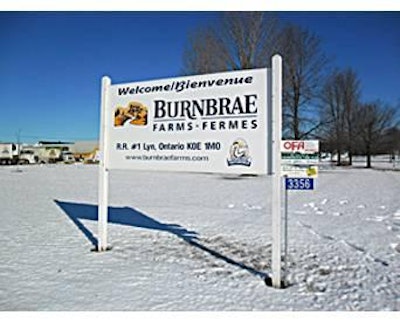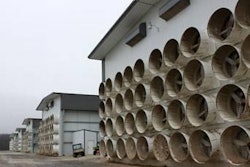
Burnbrae Farms is one of Canada’s largest integrated family-owned egg businesses with production, grading and further processing operations in five provinces. But the success, size and reach of the company does not mean that it has become divorced from its origins.
The business can trace its origins to a 100-acre farm outside the village of Lyn, in Eastern Ontario, which was purchased by Joseph Hudson, grandfather of Joe Hudson, in 1893. Egg production did not start until 1943, when Joe Hudson did a high school project involving laying hens. It remained sidelined, however, to the family’s Ayrshire dairy business throughout the 1940s.
In 1952, Joe and his brother Grant Hudson, constructed the first large laying barn, and production continued to grow. In 1973, the family entered the further processing market by establishing a plant in Lyn to break, pasteurize and package egg products.
Processing has grown to form a significant segment of Burnbrae’s business.
What started with rudimentary processing methods for selling frozen eggs in pails has evolved into sophisticated systems for producing and marketing everything from basic whole eggs in pails and tankers to long-life cartoned liquid eggs. Some 70 percent of the eggs produced by Burnbrae are sold as table eggs, but the remainder are sold as processed products.
The company has continued to grow and evolve, and now it includes grading and packing stations in various parts of Canada.
Current state of operations
Of course, Burnbrae Farms is a commercial operation, using the main strains of white and brown laying hens bred for commercial production across its farms in Ontario, Quebec and Manitoba. Burnbrae Farms keeps a sharp eye on consumer trends and needs, and the company has adapted its offering accordingly.
Fourth-generation Hudson family member Margaret Hudson, who is the company's president, explains: “We try to offer choice to our consumers with respect to eggs from different housing systems. We raise birds conventionally, free run or barn, and recently have added enriched cage and aviary systems.”
She continues: “We grow birds in housing systems matching the subsequent laying system so birds are well adapted to the laying house environment.
In addition to producing its own eggs, Burnbrae Farms purchases eggs from other egg farmers across the province. In this way, the company is able to sell eggs from a variety of housing systems, including free range and organic, depending upon what the market requires.
Burnbrae has grown from a single family farm to a thriving agribusiness with farms across Canada. In addition to producing table eggs, it now processes eggs and egg products for many of the private- and brand-name labels. As a family-run farming organization, it aspires to achieve the highest standards in environmental protection, workplace safety and animal welfare.
Sourcing eggs from other producers does not compromise the company’s standards. All egg farmers in Canada are required to follow the Egg Farmers of Canada’s Animal Care Program, which is based on the Recommended Code of Practice for the care and handling of pullets, layers and end-of-lay hens in Canada.
The Animal Care program was implemented across all of Canada’s provinces in 2003, and builds on the Egg Farmers of Canada HACCP-based Start Clean-Stay Clean program, which ensures a high level of biosecurity and a clean, safe and healthy product.
Taking extra care
The Hudson family members are firm believers that the business’ success is dependent on the good care and attention that is given to its birds, and that a healthy hen is a high-quality producing hen. Margaret says that abiding by this belief is not only good business but a moral commitment.
Additionally, and no less importantly, the business operates with a strong commitment to the environment and the reduction of its environmental footprint.
A number of initiatives are in place, and awareness has been raised through the development of a logo and mission statement. Burnbrae has been working with Energy Advantage for some time and has implemented an ongoing employee energy awareness program at all facilities across Canada.
Fourth-generation Hudson family member Helen Anne, director of corporate social responsibility, says: “The energy awareness program continues to gain momentum as we are working with Energy Advantage to benchmark our use of energy and water and our waste production. We have set goals to reduce the use of these inputs and increase our recycling of waste.
“The actual process of beginning to track the use of resources has been a huge eye-opener.”
The company’s commitment to the environment does not stop with being reactive; the company is also strongly proactive. Among projects being carried out are forest management and wetland restoration.
“We have [a] large land base in Lyn, which gives us ample opportunity to plant trees and to work with organizations, such as Trees Ontario and Maple Leaves Forever.
“Burnbrae Farms reforested abandoned farmland with 10,000 native trees in 2012 and will pant another 5,000 this year. In addition, to celebrate Earth Day, each year we plant ornamental trees at Burnbrae Farms locations across the country. Native trees provide habitat and food for wildlife while helping to reduce greenhouse gases.”
Clearly, Helen Anne has a passion for the environment, but what is the driver behind this?
“Caring for the environment is what farmers do. If you take care of your land, it will take care of you.
“The Hudson family has lived for generations on the land at the home farm, marking 120 years in 2013. We have a passion for land that has been part of our lives forever. Walking in the woods, passing 150-year-old trees on the farm roads that your grandfather must have driven by with his team of horses, seeing the wild turkeys in ever-increasing numbers, all remind us we are the stewards of this land.
“We need to leave the land in the same condition or better than when it was given to us. We feel strongly about this, while at the same time, balancing it with the responsibility of food production.”
This commitment to the environment does not mean that Burnbrae is not a strong industry player or divorced from the realities of the modern world. The latest energy saving technologies are being employed on the farm and in its operations. The company also makes use of the latest communication channels, such as social media. In 2011, Burnbrae Farms was named by Deloitte as one of Canada’s 50 best-managed companies.
Burnbrae remains focused on the Canadian market, yet no market today exists in isolation.
Helen Anne believes that there are many issues facing the industry at home and overseas. In many markets now, consumers are being offered a greater choice of eggs laid in a variety of housing systems. As the world population is projected to grow to 9 billion over the next 40 years, foods with a good sustainability profile, such as eggs, will become more important in feeding the global population, she believes.
The egg industry could be positioned as a major supplier of high-quality food for less cost to the consumer and minimal cost to the environment.
Secret of success
So what has been the secret of success in becoming one of Canada’s largest egg producer?
“Burnbrae Farms has been very innovative in new product promotion, but that is far from the end of the story,” says Helen Anne. “We have excellent people working for the company and with the company, who help us give the very best care to our hens, manage our locations and promote what we do. It is definitely a team effort. We do try to meet consumer demand and provide products with different attributes accordingly, yet alongside this, we are strong community supporters.”
Margaret further adds: “Our farming methods need to evolve to balance the needs of the animals with those of the environment, farm workers and consumers who need safe affordable food. To do this, we need to rethink our approach to agriculture, and the biggest challenge for the current generation of farmers is to come up with a new agricultural paradigm that will strike this balance and then to communicate it openly to non-farming communities.
“In the end, our goal is to continue to make a difference in the lives of Canadians by producing safe and high-quality products that enhance their health at reasonable prices that everyone can afford.”


















